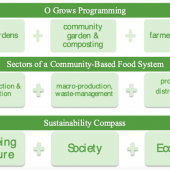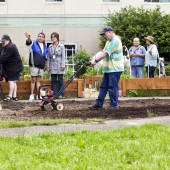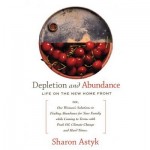
Abstract: This program feature documents our reflections on how the work of O Grows, is, or more accurately has become, increasingly sustainability-oriented. O Grows is a non-profit, community-university partnership with the mission to leverage the local capacity in service of community food needs. Specifically, we focus here on how engagement with an increasing number of sectors of the local food system, as we work toward this mission, has demonstrated a commensurate increase in alignment with the cardinal directions of the sustainability compass—attention to Nature, Society, Economy, and Wellbeing. We have realized, as O Grows has evolved, that keeping the program going and attending to sustainability are one and the same. As such, we argue the sustainability compass is a useful heuristic not only for reflection after-the-fact but also for partnership planning.
Continue Reading
Experiential and inclusive sustainability leadership practices in learning garden programs can lead to increased community food security. This recent study shows that Oregon Food Bank’s Seed to Supper program increases food literacy, builds social capital, and creates opportunities for fostering inclusive leadership in learning garden communities. Through a mixed-methods community-based research process, the study found that learner empowerment through food literacy and sustainability leadership increased access to locally-grown foods for food insecure populations. The leadership model discussed in this paper uses the concept of the web of inclusion (Helgesen, 1990) as a framework for discussing the intricate social networks within the Seed to Supper program.
Continue Reading
Dennis Lum helps put Sharon Astyk’s book in a historical context and brings forth its pessimistic premise along with its optimistic prescription. While accepting that the crisis is here, and the oil reliance has reached its peak, Astyk sees a special place for the role of women in providing food security while re-inventing a truly productive home environment.
Continue Reading